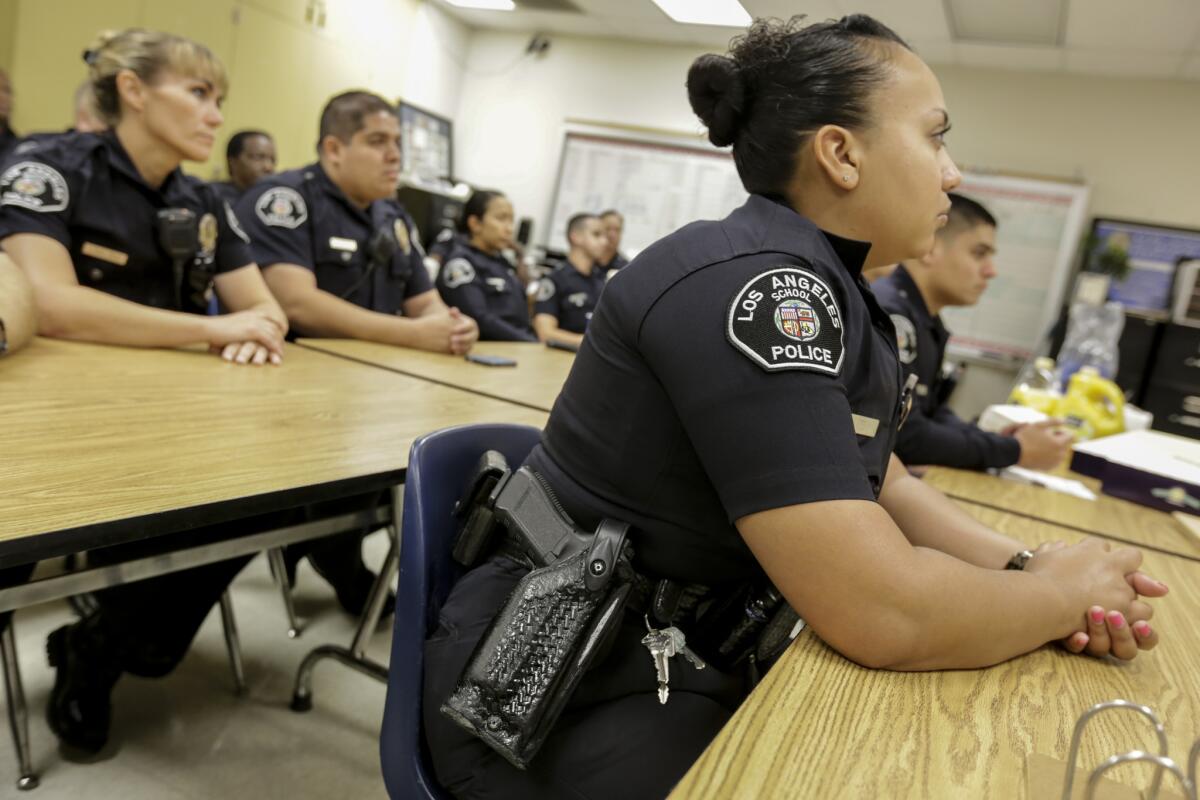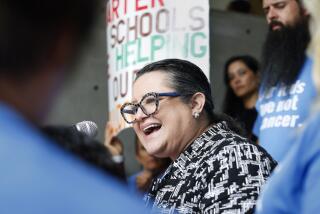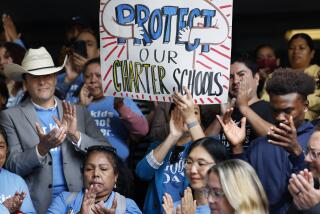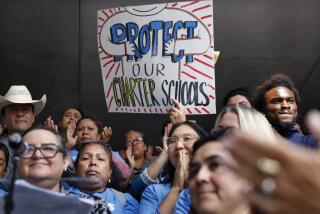Readers React: LAUSD’s ‘restorative justice’ discipline policy disempowers teachers

Los Angeles School police officers listen to a briefing at King Drew Magnet High School of Medicine and Science.
To the editor: The article on the Los Angeles Unified School District’s new discipline policy, which focuses more on “restorative justice” and less on punishment, goes to the core of why public education has so deteriorated. (“Why some LAUSD teachers are balking at a new approach to discipline problems,” Nov. 7)
If a teacher cannot maintain discipline in the classroom, and if disruptive misbehavior cannot be prevented, then how can any student expect to learn? Who can justify depriving a teacher of the ability to suspend a willfully defiant student?
There can be no valid excuse for the student behavior described in the article. A child who has been abandoned by his father might blame his negative attitude on his sad situation, but surely there are means of coping with this without destroying the public education system.
A child must be made to grasp the notion that in order to profit from the benefits of society, he must conform to its rules.
Francis B. Kent, North Hollywood
..
To the editor: That student suspensions in LAUSD have plummeted only means that the number of unproductive and stressful classroom days for good students and their teachers has dramatically spiked.
With defiant and disrespectful students no longer facing serious consequences for their behavior aside from being sent to a talking circle, LAUSD teachers will either leave their profession or find employment at other school districts that require students to pay a price for bad behavior.
Stuart Weiss, Los Angeles
..
To the editor: Some teachers miss (or ignore) one of the most important points: The fight to end punitive school discipline and the school-to-jail track has been a community struggle against educational racism and the disproportionate punishment of black and brown students with suspensions, expulsions and citations or even arrests.
In fact, the LAUSD adopted the Discipline Foundation Policy in 2007, so teachers should stop saying this program was imposed overnight.
While it’s good that United Teachers Los Angeles has been an ally over the past year and a half, the reality is that addressing racism in our schools means addressing the beliefs and practices of teachers, who seem to have the strongest aversion to restorative justice.
The $60 million spent by the district on school police would go a long way toward funding restorative justice, counselors, mental health specialists and social workers to keep kids in school. But we as a society must first address how our funds are set up for punishment and exclusion and not building supportive educational spaces.
Manuel Criollo, Los Angeles
The writer is director of organizing for the civil-rights advocacy group Community Rights Campaign.
..
To the editor: I had to read this article twice to confirm there was absolutely no mention of the word “parents” or their responsibility for the behavior of their kids. I guess The Times felt they weren’t worth mentioning.
No wonder kids do whatever they want as apparently no one expects parents to raise their children correctly. Pathetic.
Steve Owen, San Diego
..
To the editor: Restorative justice will only encourage more parents to look at other school programs for their children.
Magnet programs, charter schools and even private schools are much better alternatives for the parents of well-behaved students. Those are the places where good students can get real justice.
I wonder what schools the children of officials who support this liberal policy attend.
Juan Briones, West Hills
Follow the Opinion section on Twitter @latimesopinion and Facebook
More to Read
A cure for the common opinion
Get thought-provoking perspectives with our weekly newsletter.
You may occasionally receive promotional content from the Los Angeles Times.






